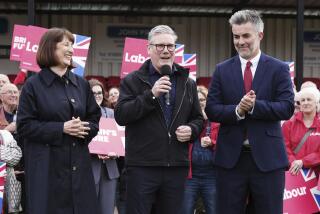Democracy ‘Quake’ in Hong Kong
- Share via
HONG KONG — Pro-democracy forces made their strongest showing in local elections Sunday, defeating candidates from Beijing-friendly parties in several key contests and increasing pressure on Tung Chee-hwa’s government for democratic reform in the territory.
The victories carried added legitimacy because they were accompanied by a record voter turnout as residents, clearly disenchanted with Tung’s performance and the highly restrictive system that chose him, signaled their desire for change.
The results constitute the latest -- and most dramatic -- evidence that the massive public protest of July 1 did more than just derail an unpopular anti-subversion law viewed by residents as a threat to freedom of speech. It appears to have awakened an activism for greater democracy and shifted the center of political power in Hong Kong away from the government.
Heartened by the impact of the protest on the political process, thousands of additional residents -- mainly young people -- had registered to vote, and Sunday’s election marked their first opportunity to do so.
“Earthquake, tidal wave, whatever word you want to choose, it fits,” said Michael DeGolyer, head of a project that has tracked public attitudes through the territory’s transition from British colonial rule to its current status as a quasi-autonomous special administrative region of China.
Under the terms of the 1997 transfer of sovereignty, Hong Kong’s residents enjoy freedom of speech and many other civil liberties denied to the mainland, but suffrage rights are limited. Fewer than half of the 60 members of the territory-wide Legislative Council are chosen by popular vote, and Tung himself was reelected two years ago by a group of 800 elite Hong Kong residents approved by Beijing.
According to results announced before dawn today, democratic candidates won 95 of the 120 seats they contested in elections to Hong Kong’s 18 district councils. At the same time, the pro-Beijing Democratic Alliance for the Betterment of Hong Kong, or DAB, suffered heavy losses. DAB Chairman Jasper Tsang offered to resign, but party officials said no decision would be made immediately.
Although the councils normally deal mainly with precinct-level issues such as traffic congestion and zoning laws, the issue of democratic reform dominated several key races.
In one constituency encompassing central and western Hong Kong island, for example, pro-democracy candidate Cyd Ho defeated her DAB opponent Ip Kwok-him in a high-profile campaign that focused almost exclusively on the candidates’ positions on the controversial anti-subversion bill and the future of democratic reform.
As his party’s vice chairman, Ip played a leading role in trying to help the government win passage of the unpopular bill, while prominent opponents of the initiative campaigned for Ho.
This month, those same pro-democracy activists announced the formation of a lobby advocating reforms that would allow Hong Kong’s next chief executive to be chosen by universal suffrage when Tung’s term expires in 2007.
“The people have spoken loud and clear through the ballot box,” Ho said. “They want more political rights. I hope it sends a clear message to Tung’s administration that there should be no more delay to democratic reform.”
More to Read
Sign up for Essential California
The most important California stories and recommendations in your inbox every morning.
You may occasionally receive promotional content from the Los Angeles Times.













